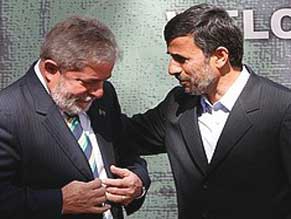|
World Jewish News

By ASSOCIATED PRESS
|
Iran agrees to ship most of its enriched uranium to Turkey
17.05.2010, Israel and the World Iran agreed Monday to ship most of its enriched uranium to Turkey in a nuclear fuel swap deal that could ease the international standoff over the country's disputed nuclear program, just as pressure mounts for tougher sanctions.
The deal was reached in talks with Brazil and Turkey, elevating a new group of mediators for the first time in the dispute over Iran's nuclear activities.
There was no immediate comment from the United States and the other world powers that have led earlier negotiations as to whether the new deal would satisfy them and stave off a fourth round of UN sanctions.
"It was agreed during the trilateral meeting of Iranian, Turkish and Brazilian leaders that Turkey will be the venue for swapping" Iran's stocks of enriched uranium for nuclear fuel rods to power a medical research reactor, Foreign Ministry spokesman Ramin Mehmanparast said on state TV Monday.
The deal would deprive Iran - at least temporarily - of the stocks of enriched uranium that it could process to the higher levels of enrichment needed in weapons production. The material returned to Iran in the form of fuel rods could not be processed beyond its lower, safer levels, which are suitable for use in the Teheran research reactor.
The deal goes to the heart of international concern over Teheran's nuclear activities. Earlier negotiations led by Germany and the five permanent UN Security Council members - the US, Britain, France, Russia and China - have sought to stop Iran from enriching uranium, and thereby deprive it of a possible pathway to nuclear weapons.
Monday's deal was announced after talks between Brazilian President Luiz Inacio Lula da Silva, Turkish Prime Minister Recep Tayyip Erdogan and Iranian President Mahmoud Ahmadinejad in Teheran.
UN plan could be revived
The deal could revive a plan drafted by the UN and first proposed in October, though it's not clear exactly how close it is to the original proposal, which was ultimately rejected by Iran after some initial mixed signals.
Some of the details provided by the Foreign Ministry spokesman, Mehmanparast, are the same.
For example, under the new plan Iran will ship 2,600 pounds - or about 1,200 kilograms - of uranium enriched to low levels to Turkey to trade it for fuel rods containing uranium enriched to higher levels, Mehmanparast said.
That would happen one month after a final deal is signed between Iran and its main negotiating partners and the UN's nuclear watchdog, the International Atomic Energy Agency.
It appears Iran had dropped an earlier demand for the fuel exchange to happen in stages, rather than providing its material in a single batch. It has also dropped an insistence for the exchange to happen inside Iran.
It was not clear if it was giving up on a request to receive the fuel rods at the same moment and whether they would still be manufactured in France, as called for in the UN draft. The UN draft has a gap of about a year to allow time to manufacture the fuel rods.
Reaching out to Turkey and Brazil
Iran first reached out to Turkey and Brazil in its efforts to avoid tougher UN sanctions for its refusal to stop enriching uranium altogether. Both countries are non-permanent members of the Security Council.
Monday's deal was signed by the foreign ministers of Iran, Turkey and Brazil.
Iran says its enrichment program is only meant to develop fuel for peaceful uses, such as producing nuclear energy.
Mehmanparast said a letter will be sent to the IAEA within a week to pave the way for a final agreement.
"Should they be ready, an agreement will be signed between us and the group," he said, referring to the US, France, Russia and the IAEA.
A month later, the uranium - currently enriched to a level of 3.5 percent - would be sent to Turkey, where it would be stored under IAEA and Iranian supervision, Mehmanparast said. The fuel rods would contain material process to just under 20 percent.
Enrichment of 90 percent is needed to produce material for nuclear warheads.
JPost.com
|
|
